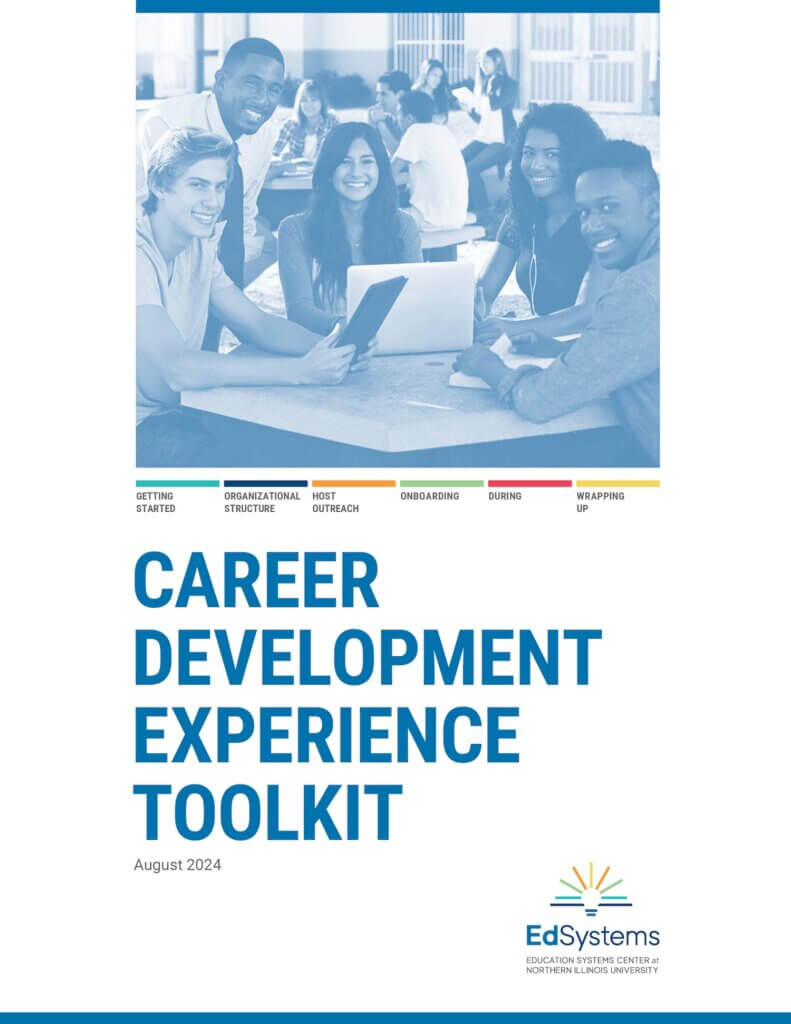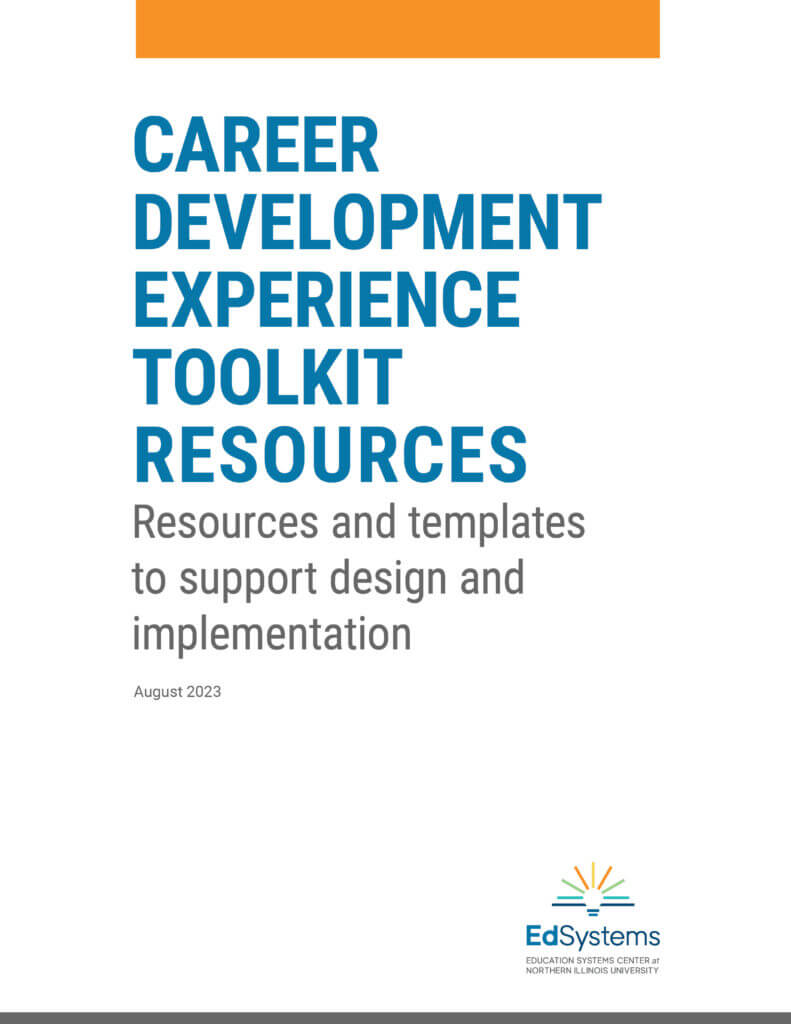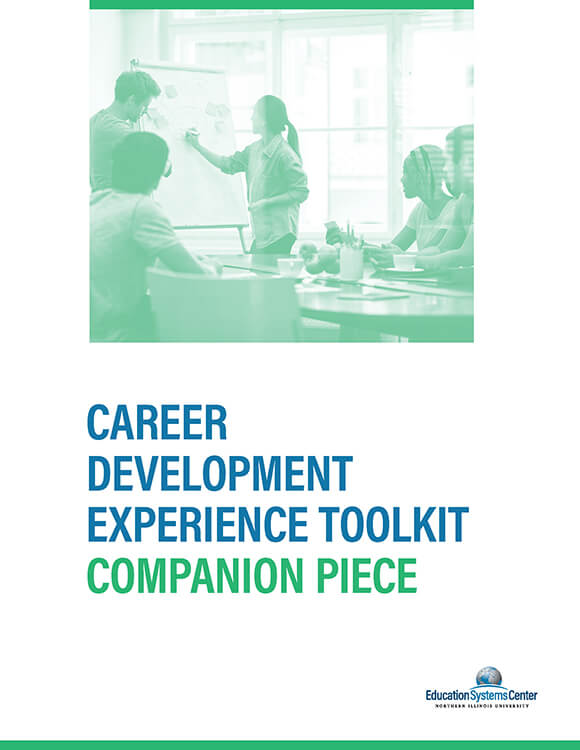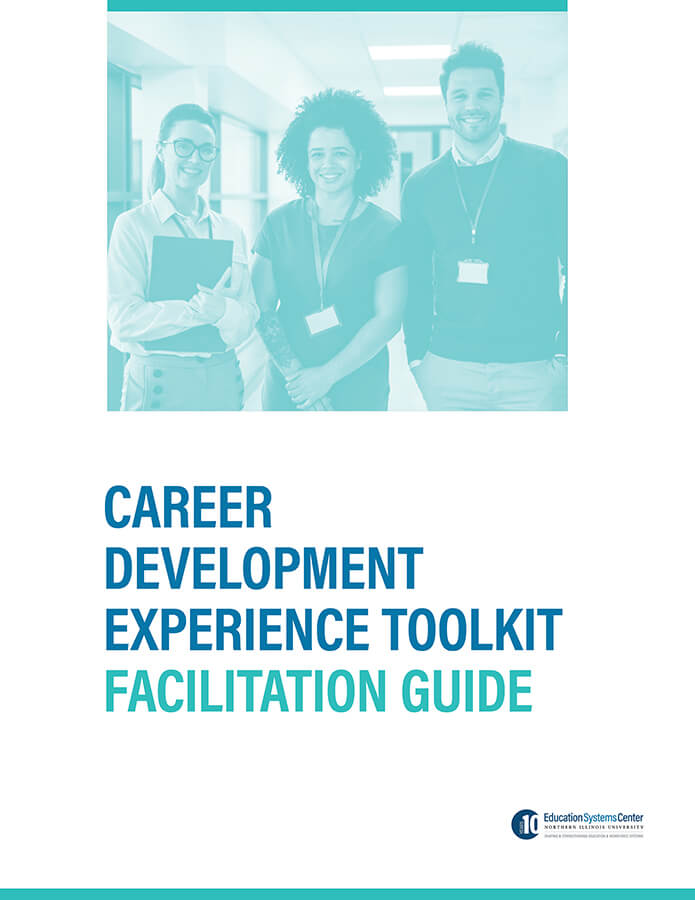Career Development Experience Toolkit
Released in 2019, the Career Development Experience Toolkit adheres to the Postsecondary and Workforce Readiness (PWR) Act’s framework for College and Career Pathway Endorsements. While these materials adhere to the endorsement framework for public high school students, they serve any organization seeking to provide youth with rigorous work-based learning opportunities. In 2021, EdSystems released a Companion Piece to provide resources to address the needs of stakeholders outside of a traditional high school setting. In 2022, the team released a Facilitation Guide.
Implementation of the toolkit and its accompanying resources should be done with careful consideration of your participants. The practices listed are not exhaustive and are meant to be adaptable to fit the needs of your community.
Introduction
What is a Career Development Experience?
A supervised career development experience must include the following:
- A course transcription and corresponding school credit for the experience or compensation of the student’s work hours for the career development experience, or both.
- A workplace with authentic working conditions and tasks that include, but are not limited to, timekeeping, evaluation of work, responsibility to adhere to safety protocols, or adherence to the standard operating procedures of the organization. The workplace experience must reinforce the relevant technical and essential employability competencies.
- Collaboration between the school district and the community or business partners in developing and monitoring the experiences.
- Feedback given to the student.
- At least 60 hours of participation completed by the student through a single experience or across two experiences; however, no individual experience may be less than 20 hours.
In addition to workplace settings in business or community partner locations, a supervised career development experience may include a workplace setting that is (a) based in the school district if the setting is authentic and the district employee serving as a supervisor is fulfilling the role of an industry mentor or supervisor rather than the role of a classroom teacher; or (b) virtual if it includes authentic virtual, remote, or hybrid working conditions and a mentor or supervisor who is an employee of the workplace’s organization.

To learn more about implementing career development experiences, download the full toolkit and the resources bundle. The toolkit supports a comprehensive design and implementation of a career development experience, from getting started, to organizational structures, host outreach, onboarding, supports and assessments during the experience, and wrapping up the experience through thoughtful evaluations, awards, and measuring outcomes. To download individual sections of the toolkit and/or the individual resources, see below.
Getting Started Resources
- Template | Planning Timeline: PDF // Word
- Resource | Racial Equity Impact Assessment from Race Forward
- Resource | U.S. Department of Health & Human Services: Positive Youth Development Resources
- Exemplar | “Making Youth Apprenticeships Work for Illinois’ Young Adults” from Young Invincibles
- Exemplar | Guidebook of Professional Learning Experiences within Information Technology from Illinois Science and Technology Coalition
- Exemplar | Apprenticeship Framework from District 214
- Exemplar | SAE for All Student Guide from Supervised Agricultural Experience
- Exemplar | SAE for All Teacher’s Guide from Supervised Agricultural Experience
- Resource | WIOA Regional Planning from DCEO
- Resource | Labor Market Information from Illinois Department of Employment Security
- Resource | Pathways to Prosperity: Work-Based Learning Intermediaries from JFF
- Resource | Work-Based Learning Delivery Systems, Intermediary Design, Diagnosis, and Improvement from JFF
- Resource | Career, Wages, and Trends Search from Illinois workNet
- Resource | Demand Occupations from Illinois workNet
- Resource | Detailed Information on National Career Clusters and Related Programs of Study from Illinois workNet
- Resource | Labor Market Information: Step-by-Step Guide from Illinois workNet
Organizational Structure Resources
- Exemplar | Partnership Manager Role Description from District 214
- Exemplar | Health Occupations and Professions Exploration (HOPE) Program from UW Health
- Resource | Post-Secondary Counseling Working Group Counselor Skills and Competencies Recommendations from Chicagoland Workforce Funder Alliance
- Resource Bank | Motivational Interviewing for Schools
- Resource Bank | Community Resources from YouthBuild USA and the U.S. Department of Labor
- Resource Bank | Global Partner Tools from Illinois workNet
- Template | Pre-Assessment Participant Interview: PDF // Word
- Resource | Rethink CTE: Fact Sheet from Illinois State Board of Education and Illinois Community College Board
- Resource | The Importance of Disaggregating Student Data from Safe Schools Healthy Students
- Resource | Roadmap to Success: Rural Transportation Connections from the National Farmworker Jobs Program
- Article | “Ways of Getting to Work” from Illinois workNet
- Website | The Agriculture Experience Tracker (AET)
- Resource | Not As Hard As You Think: Engaging High School Students in Work-Based Learning from JFF
- Resource | Fact Sheet #71: Internship Programs Under the Fair Labor Standards Act from U.S. Department of Labor
- Resource | Youth Employment Compliance Assistance Toolkit from U.S. Department of Labor
- Website | YouthRules! from U.S. Department of Labor
Host Outreach Resources
- Article | “5 Myths about High School Interns and Why Your Business Should Hire Them”
- Resource | Participant Task Examples by Pathway Endorsement Area
- Resource | Partnering with Employers from YouthBuild USA and the U.S. Department of Labor
- Resource | Reimagining Employer Engagement Toolkit from Reimagine Retail Chicagoland
- Resource | Employer Engagement Toolkit: From Placement to Partners from JFF
- Template | Host Site Request Email: PDF // Word
- Exemplar | Early College STEM Schools “Hire an Intern” Flyer from Chicago Public Schools
- Exemplar | Pathway Sponsorship Program from Alignment Rockford
- Template | Host Site Request Email: PDF // Word
- Template | Prep to Elevator Pitch from Tennessee Department of Education
- Resource | Pathways to Prosperity: What Employers Need to Know from JFF
- Resource | Employer Outreach and Marketing from Illinois workNet
- Template | Host Profile: PDF // Word
- Template | Host Site Assessment: PDF // Word
- Resource | Worksite Placement Tool from Illinois workNet
Onboarding Resources
Onboarding for Participants
- Template | Participant Profile: PDF // Word
- Template | Pre-Assessment Participant Interview: PDF // Word
- Template | Participant Placement Email/Letter: PDF // Word
- Template | Participant Self-Assessment of Essential Employability Competencies: PDF // Word
- Resource | Career Guide from Illinois State Board of Education
- Resource | Parent Engagement Tip Sheet from Youth CareerConnect
- Resource | Skill & Interest Surveys from Illinois workNet
- Template | Participants Program Outline & Expectations: PDF // Word
- Resource | Pre-assessment/Career Surveys from Illinois workNet
- Resource | Skills to Pay the Bills: Mastering Soft Skills for Workplace Success from the U.S. Department of Labor’s Office of Disability Employment Policy
- Resource | Supporting In-School and Out-of-School Youth Experiencing Homelessness Through Education and Workforce Partnership from the National Center for Homeless Education
- Resource | Employment 101 from Illinois workNet
- Template | Participant Orientation at Host Site: PDF // Word
- Template | Participant Host Site Background Research: PDF // Word
- Template | Participant “About Me” Profile: PDF // Word
- Exemplar | Teen Volunteer Application from Cancer Treatment Centers of America
- Resource | State-by-State Non-Drive Identification Requirements from National Network for Youth
- Resource | Money Smart: Youth Employment Resource Center from FDIC
- Template | Participant Business Card
- Resource | GetMyFuture Website from CareerOneStop
- Resource | Job Skills Guides from Illinois workNet
- Resource | Employment 101 from Illinois workNet
Onboarding for Hosts
- Template | Host Orientation Presentation: PowerPoint
- Template | Guidebook for Hosts: PDF // Word
- Resource | Participant Tasks Examples by Pathway Endorsement Area
- Resource | Questions for Experienced Hosts
- Resource | Workplace Accommodation Toolkit from the Job Accommodation Network (JAN)
- Resource | Inclusive Internship Programs: A How-to Guide for Employers from the U.S. Department of Labor
- Template | Participant Orientation at Host Site: PDF // Word
- Resource | Host & Participant Check-In Meetings
- Resource | A Mentor’s Guide to Youth Development from the U.S. Department of Education
- Resource | Ladder of Young People’s Participation by Roger Hart
- Resource | Creating a Youth-Friendly Workplace: An Employer’s Guide to Building a Quality Internship from the Sacramento Employment and Training Agency
- Resource | Social, and Emotional Learning Framework from CASEL
During
- Template | Recording CDE Hours: PDF // Word
- Resource | Host & Participant Check-In Meetings
- Resource | Participant Task Examples by Pathway Endorsement Area
- Resource | Participant Reflection Questions
- Resource | Observational Assessment and Worksite Evaluation tools from Illinois workNet
- Resource| Example Professional Skills Assessment for Education Pathway from Making Opportunities Real for Everyone (MORE) in the Mississippi and Rock River Region
- Resource | A Guide to Providing Feedback to Participants
- Resource | Helping Your Customers Stay Motivated and Engaged from Illinois workNet
- Resource | Worksite Evaluation from Illinois workNet
- Exemplar | Supervised Agricultural Experience: Visit Scheduling Form
- Exemplar | Supervised Agricultural Experience: Visit Checklist
- Template | A Guide for Site Visits at Hosts
- Resource | Hype Cycle from Gartner
- Resource | A Guide to Providing Feedback to Participants
- Resource | A Guide to Difficult Conversations
- Template | Navigating Challenges Worksheet: PDF // Word
- Template | Participant Improvement Plan: PDF // Word
Wrapping Up Resources
- Template | Participant Evaluation of Host & Organization: PDF // Word
- Template | Participant Presentation: PDF // PowerPoint
- Template | Certificate of Completion
- Template | Host Evaluation of Participant & Organization: PDF // Word
- Resource | Participant Exit Interview with Host
- Resource | Principles for Sustaining Employer Partnerships from Tennessee State Government
- Article | Learning Goes Both Ways from Rush Education and Career Hub
- Exemplar | District 214 Center for Career Discovery Internship Videos





